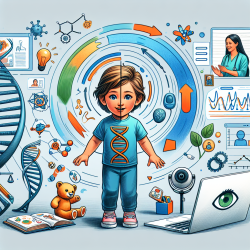Introduction to ADHD and Genetics
Attention Deficit Hyperactivity Disorder (ADHD) is a prevalent childhood-onset condition characterized by symptoms of inattention, impulsivity, and hyperactivity. Recent research highlights the significant role genetics play in the etiology of ADHD. This blog explores the genetic underpinnings of ADHD and provides insights for practitioners to enhance their understanding and approach to treatment.
Genetic Insights from Research
Decades of research, including family, twin, and adoption studies, have established that ADHD is highly heritable, with estimates suggesting a heritability of approximately 74%. This indicates a strong genetic component, motivating the search for specific genes associated with ADHD. Genome-wide association studies (GWAS) have identified several genetic loci that contribute to the disorder, though each has a small effect individually.
Recent studies have also highlighted the polygenic nature of ADHD, where many common genetic variants collectively contribute to its heritability. Additionally, rare copy number variants (CNVs) have been implicated, suggesting that both common and rare genetic factors play a role in ADHD's etiology.
Implications for Practitioners
Understanding the genetic basis of ADHD can significantly impact how practitioners approach diagnosis and treatment. Here are some practical steps for practitioners:
- Stay Informed: Regularly update your knowledge with the latest research findings on ADHD genetics to inform your practice.
- Consider Genetic Testing: While not yet standard practice, genetic testing can offer insights into individual cases, particularly for treatment-resistant ADHD.
- Personalized Treatment Plans: Use genetic information to tailor interventions and monitor treatment responses, enhancing the effectiveness of therapeutic strategies.
- Collaborate with Geneticists: Work alongside geneticists to better understand complex cases and integrate genetic insights into comprehensive care plans.
Encouraging Further Research
While significant progress has been made in understanding the genetic basis of ADHD, much remains to be discovered. Practitioners are encouraged to engage with ongoing research and consider participating in studies that explore the genetic and environmental interactions in ADHD. This collaboration can lead to breakthroughs in treatment and management strategies.
Conclusion
The genetic research on ADHD provides valuable insights that can transform how practitioners approach this complex disorder. By integrating genetic knowledge into practice, we can improve outcomes for children with ADHD and support their development more effectively.
To read the original research paper, please follow this link: Genetics of attention deficit hyperactivity disorder.










